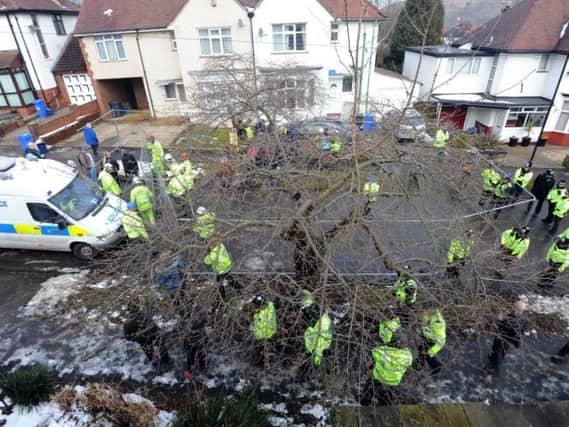Law firm called in to investigate Sheffield Council's secrecy tactics over tree-felling saga


Law firm Bevan Brittan have been commissioned by the council to investigate whether the attempted use of legal privilege to stop emails entering the public domain via Freedom of Information requests was applied properly.
The council - which has already previously admitted some emails were "incorrectly marked" in this way - said the law firm will provide recommendations on "best practice" to feed into its complaints procedure.
Advertisement
Hide AdAdvertisement
Hide AdIt follows a complaint from street tree campaigner and FoI expert Marcus Combie to the council in relation to its use of legal privilege in emails and FoI.


Emails involving senior council officers about Operation Quito - a major police operation supporting the council’s street tree-felling operations in early 2018 in light of increasing protests against the policy - were released to Mr Combie in late 2019.
Several of them were given the subject line ‘Covered by legal privilege and not subject to FOI’ and largely related to the council’s involvement in a shared media strategy with South Yorkshire Police and a wish not to publicise it for fear of ‘politicising’ the force’s operation.
In one example, an email from Paul Billington, Sheffield Council’s then director of culture and environment, sent a week before the beginning of Operation Quito on February 26, 2018, to Laraine Manley, executive director of place, and Steve Eccleston, assistant director of legal services, said it had been agreed the authority would “work closely” with the police and highways contractor Amey on media communications.
Advertisement
Hide AdAdvertisement
Hide AdThe email, which was entitled ‘Covered by legal privilege and not subject to FOI – Gold Command – Quito’ but subsequently made public under Freedom of Information laws, said on February 20: “SCC prefer not to front the comms because this politicises the operation and makes it an easy target for protestor comms and therefore more difficult for Amey, SYP and us.
“We will be heavily involved in Silver (Command) as Highways Authority, but best for everyone we don’t front the comms.”
The police had insisted publicly they were ‘entirely impartial’ in the dispute between the council and protesters.
Among those copied into some of the email chains were then council leader Julie Dore and Councillor Bryan Lodge, who at that time was cabinet member for environment and streetscene.
Advertisement
Hide AdAdvertisement
Hide AdA further FoI request later revealed an email sent by Mr Eccleston in February 2020 in which he said he had “asked for potentially privileged emails involving lawyers” to carry the ‘legal privilege applies’ header.
He said: “I recognised that there would be a huge amount of email traffic and, in due course, a number of FOIA’s. I was aware, in that context, that identifying which emails might be subject to FOIA would be a mammoth task. The purpose of those header was to facilitate filtering potentially applicable emails to make life easier.
“I was well aware that the ‘Public Interest Test’ has to be applied so there would always need to be that extra layer of checking but I was of the view that, without something like this: 1. The task would be monumentally time consuming and difficult 2. Emails which shoddily [sic] remain confidential because of privilege might be inappropriately released.
“It would facilitate a process of “thinking”. I was also aware that there was a risk that it would be wrongly applied but, also, that the necessary checking process would also pick this up so I wasn’t concerned about that. I considered that the bigger risk was the opposite: emails being released wrongly.”
Advertisement
Hide AdAdvertisement
Hide AdIn March 2020, the council’s executive director of resources Eugene Walker said the council now accepted that some emails had been “incorrectly marked”.
His statement said: “Officers marked some emails with the term ‘legally privileged not subject to FOI’ where they considered there might need to be a decision about future disclosure.
“We accept that, as a result, there were a number of emails that were incorrectly marked, and that were never exempt from release under Freedom of Information law. We are confident that our internal processes uphold the FOI law as set out by the Freedom of Information Act 2000.”
After seeking further information about the attempted use of the legal privilege exemption via FoI from March 2020, Mr Combie made official complaints about the practice to the council in March 2021 about the practice.
Advertisement
Hide AdAdvertisement
Hide AdEarlier this month, the council informed him Bevan Brittan had been commissioned to investigate how the council applied legal privilege to emails. The work is being led by an information law specialist who will be able to interview council officers.
The firm’s findings will inform the council’s response to Mr Combie’s complaints. He has been told the standards complaint will not apply to former leader Julie Dore as she is no longer a councillor.
A Sheffield City Council spokesperson said: “In March 2021 the council received a complaint from a member of the public about the use of legal privilege in emails and FOI.
“This matter has been looked at previously and submissions made to the Information Commissioner's Office who, at the time, were satisfied with the council’s response. However, in line with the council’s complaints procedure, where matters relate to elected members, this is being considered further and is standard procedure.
Advertisement
Hide AdAdvertisement
Hide Ad“A law firm has been enlisted by the council to examine the factual background of this matter, which will include looking at random FoIA requests to give their view and make any recommendations on best practice. These findings will then be used to feed into the complaints process.
“We remain committed to working in an open and transparent way and examinations are part of how we achieve this.”
The spokesperson said it was “too early” to say whether the findings will also form part of a forthcoming inquiry into the wider lessons of the tree saga, which is expected to begin later this year.
The inquiry has been ordered following the establishment of a new "cooperative administration" between Labour and the Greens in the city.
Advertisement
Hide AdAdvertisement
Hide AdPrior to this month's election, in which Labour lost overall control of the control, the party had been resisting an inquiry into the saga, which saw thousands of street trees felled and replaced with saplings as part of a £2bn highways management contract with Amey. Campaigners argued many of the tree fellings had involved healthy trees and had been unnecessary.
The increasingly-bitter dispute reached its height in early 2018 with Operation Quito, which saw dozens of police officers and private security guards accompany daily felling operations in the wake of growing protests. The council has since changed course and adopted a strategy designed to save more trees.
In October last year, the council was ordered to apologise to the people of the city after a damning Ombudsman report found it had misled the public, misrepresented expert advice and acted with a "lack of honesty" over the course of the saga.
Support The Yorkshire Post and become a subscriber today. Your subscription will help us to continue to bring quality news to the people of Yorkshire. In return, you'll see fewer ads on site, get free access to our app and receive exclusive members-only offers. Click here to subscribe.